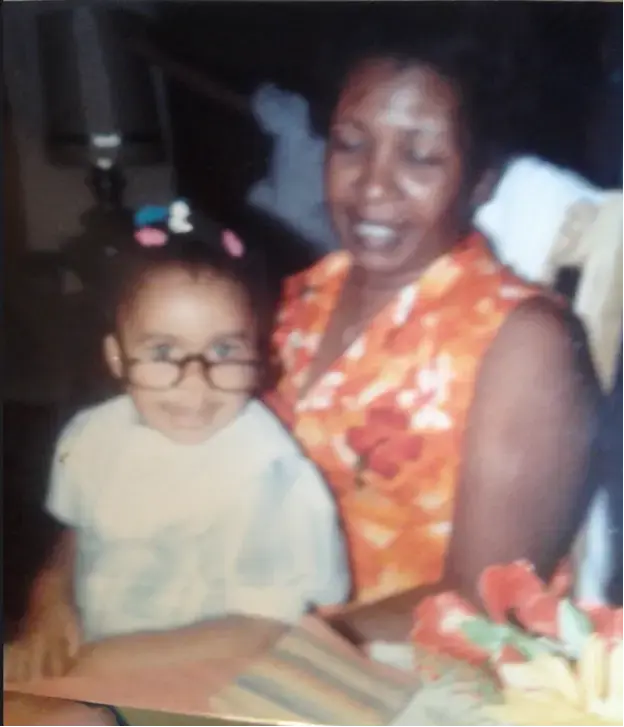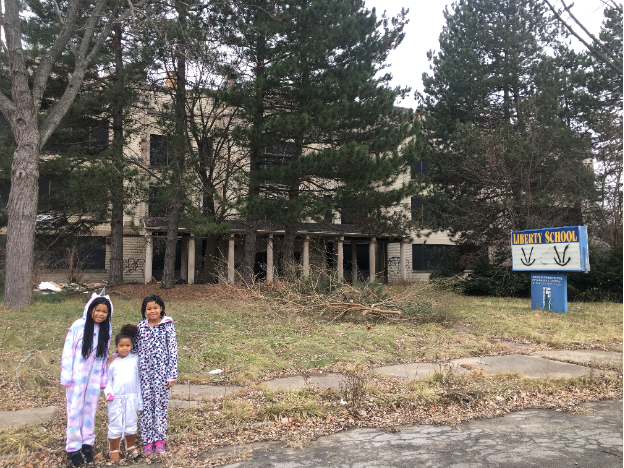ID: Three year old Andrea wearing her grandmother’s glasses and barrettes, smiling while sitting in the lap of her grandmother.
This winter was frigidly cold, and as March arrived it took me a while to warm up to writing from the perspective of women's history. It wasn’t the weather so much as the labor intensive efforts, repair, and lessons learned that filled my weeks. Each month had it’s own stark challenge that made it feel colder than it actually was. This year, March came at the end of one of the harshest winters I’ve had in a long time.
With signs of Women’s History Month all around me, I sat down to write. I considered women in my village from the theatre community, my daughters’ teachers, and others who have had a huge impact like our local librarian who has watched them grow from diapers to preparing for middle and high school. At home, in our neighborhood or within our small circle of family and friends, there were so many women whose praises I wanted to sing.
I considered each of these women, yet found myself overwhelmed with thoughts of my great grandmother, grandmother, mother, sister, aunts. Maybe it was the harshness of the winter that brought them so close to the front of my mind. Those frigid months that made me call on all that I’d learned from them. Women who taught me how to be in my own skin, no matter the circumstance. Women who had purpose and taught me things I could have never learned in school. During those months as my daughters crossed new thresholds and I faced my own limits, I found myself actively remembering the women who raised me. All the while acknowledging my own abilities, and discovering how to apply them as needed.
I actually thought a women’s history piece would be easy to write. Admittedly it’s been one of the hardest. To write about other women felt doable, but the women whose hairstyles I wear, and sounds I carry when I speak were somehow too close. I couldn’t tell one singular story about any of them, because each story was connected to everything I ever knew.
Finally, I became laser focused on my maternal grandmother, Martha Thomas. Growing up she was a fierce Matriarch. Not the warm and fuzzy type, but the hunter and the gatherer in one, type. And those are exactly the kind of women she made. Martha’s daughters and their daughters became their own kind of fierce. Protectors and keepers of even more women.
" To write about other women felt doable, but the women whose hairstyles I wear, and sounds I carry when I speak were somehow too close. I couldn’t tell one singular story about any of them, because each story was connected to everything I ever knew"

ID: Three year old Andrea wearing her grandmother’s glasses and barrettes, smiling while sitting in the lap of her grandmother.
Every family has their own unique composition and mine happens to be made up of mostly women. Being one of Ms. Martha’s “kids” (which is what people in my neighborhood called any child related to my grandmother) meant I belonged to a group of children who were untouchable. I felt special. I belonged not only to Ms. Martha, but to her youngest daughter, and even deeper, I belonged to my older sister. Of every generation, I was theirs and they were mine. An entire tribe of women. Daughters of mothers and sisters of sisters. Women responsible for each other. An enmeshment like no other. An inescapable salvation that we’re all still trying to unpack.
As I write this, I’m smiling looking at pictures from last summer when I packed up my daughters and drove to Detroit to see my grand and their great grandmother.
I remember arriving with my girls, walking in and seeing a sweet little old lady holding a teddy bear as she sat in her wheelchair. Though in the early stages of dementia, she could still recall my name and face. I said, “Hey Grandma it’s me Drea!” Her response was an audible attempt to gather her thoughts and calm her surprise. She said, “Annnnndreeeea,” as if to say where have you been?!
She knew I was her youngest daughter’s daughter. She knew I was the granddaughter who insisted on sleeping beside her when I was little. She knew I was the one who would help her carry her camera equipment to different churches that hired her to record their services. She knew I was the one who would harass her and kiss her and ask her for snacks, even though she had a reputation for being one of the most intimidating women you’d ever met.
Now in her older years, she watched me standing over her with her face now soft and sweet, and pointed at me. As she looked in my eyes, I could tell she remembered coming to pick me and my sister up from school with our dog Jacque and the penny candy store she pretended not to notice us sneak into before we got home.
As my grandmother’s memories began to shift and melt away, I made more and more trips like these back home. I felt like I was a permanent fixture in her mind, but wanted so badly for my daughters to live there as well. Her greats. Little girls born in the 2010s whose lives were undoubtedly shaped by hers.
This winter on February 19, Ms. Martha passed away just weeks after her 95th birthday. If you read my piece on the Great Migration last month, you’ll remember her as one of the six million that made that life changing journey North.
When I told my girls about her passing, that night, they sat on the kitchen floor and recalled their time with her. They talked about how whenever we visited, grandma insisted that they tell her all about the games they played during our 10 hour drive.
"Of every generation, I was theirs and they were mine. An entire tribe of women. Daughters of mothers and sisters of sisters. Women responsible for each other."

ID: Andrea's three daughters in onesies posing in front of her old elementary school.
They remembered just a few years earlier during our trip in 2021, when I took them to an open field where the house I was raised in once stood; the home my grandmother bought in 1967 in Highland Park, Michigan. The girls told her how I made them take a picture in front of my old elementary school, Liberty, and how much I loved it there—with all my heart, actually. How I told them, me and my sister and cousins were allowed to dig dirt in her backyard on the weekends until it was a tan color and begged to stay outside after the street lights came on.
After those trips to Detroit, I could tell my daughters felt even closer to their great grandma and with that, they were satisfied. I could see the pride in their faces, having figured out a little more about their mother and the women they come from. Their esteem seemed to increase. Their sense of self. An internal recognition that they came from women who were intelligent and profoundly resourceful. Especially, their Great Grandmother who made that Great Migration to Detroit from Sunflower County Mississippi, and who lived up to every bit of that greatness. We sat and talked, and celebrated her life and said our goodbyes knowing she journeyed so far and was now making her final migration into our hearts forever.